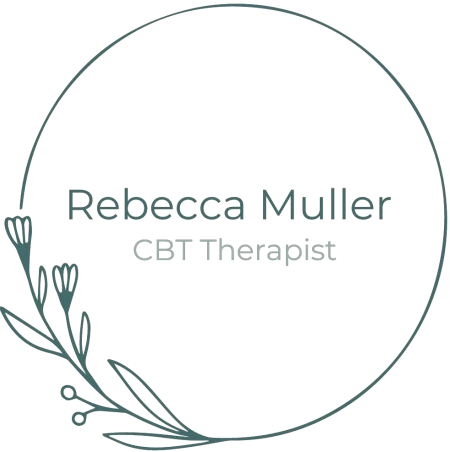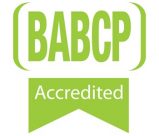Welcome to Rebecca Muller CBT & EMDR online integrative Psychotherapy
Helping Women Heal and Grow after Trauma and Loss
Process your past, ground yourself in the present, visualise your future.
I’m Rebecca Muller - a highly experienced, BABCP Accredited Cognitive Behavioural Psychotherapist, specialising in Trauma-Focused CBT and EMDR. I work with adults, offering focused support over 8-12 sessions, in line with NICE guidelines (considered the 'gold standard' for healthcare in the UK). While I'm based in beautiful North Berwick, East Lothian, all my sessions are held online, so you can access therapy from the comfort of your own home.
I'm so glad you've found your way here. If you're reading this, it likely means you're choosing to prioritise your wellbeing - and that's a powerful, brave step. Maybe something traumatic has happened, and no matter how hard you try, you can't seem to move past it. You might feel stuck, overwhelmed, or like the world has shifted in a way you didn't choose.
Perhaps your worst fear has already come true, and now you're wondering if you'll ever feel like yourself again. You may be feeling unsafe, out of control, or carrying a deep sense that something is wrong with you - blaming yourself, not feeling good enough. Most of all, you're searching for relief, for peace and a way back to yourself. These thoughts can be isolating, but they're common responses to trauma, not reflections of your worth.

You might find yourself replaying painful memories over and over - both day and night. Your mind feels foggy, and you often feel disconnected or zoned out. You're constantly on edge, scanning your surroundings for danger, jumping at even the smallest noise. You've started avoiding things that remind you of what happened, even things you once loved. Maybe you keep yourself constantly busy to drown out the mental noise but nothing really helps, it's started to feel easier to withdraw from life altogether, because always bracing for the worst has left you feeling completely drained.These reactions are not signs of weakness - they're signs that your nervous system is doing it's best to protect you after something deeply overwhelming.
How CBT can help you
From Tears to Triumph!
Given what you've been through, it's no wonder you feel the way you do. Struggling through each day is exhausting-I know because I've been where you are. I truly see you, I hear you and understand the weight you're carrying. When you're stuck in that painful loop, life can feel so empty, detached and unbearably hard.
But even if it doesn't feel like it right now, please believe me when I say: it IS absolutely possible to reclaim, or even rebuild your life, no matter how difficult things feel today. With the right support, you can move from just surviving to truly thriving again, reconnecting with the version of yourself that existed before everything changed, when the rug was pulled.
I am living proof that there is light even at the end of the darkest tunnel. If I can find my way through, so can you. Over time with my support in therapy, you'll stop blaming yourself, or believing you're broken, and instead, you'll begin to recognise that a bad thing happened to you, and that it wasn't your fault. This shift won't just be something you know intellectually, you'll begin to feel it deeply and believe it wholeheartedly.
You'll find freedom from the intrusive thoughts and memories that once took over your mind. You'll grow in self-understanding, start treating yourself with compassion, and rediscover your inner strength. Life will start to feel meaningful again. Relationships won't seem as scary, and others will begin to notice the change in you too. Most importantly, you'll feel safe, in control and worthy of the full, joyful life you deserve, returning to the things you once loved, and maybe even discovering new passions along the way
Together We are Known
In my practice I specialise in Trauma Focused CBT & EMDR, offering a compassionate and professional space where healing can begin. I believe that true recovery starts, when you feel genuinely seen, heard, known, and believed. My approach combines evidence-based techniques with a deeply relational focus, helping us build the trust and safety essential for healing. Every session honours your unique story. You're not just a diagnosis, I see the whole person behind the pain. Together, we'll work to process your trauma with care and collaboration, helping you build resilience, restore hope, and take empowered steps toward meaningful change. Your healing journey is deeply personal, and I will be with you, every step of the way.
Together in Trauma
At the heart of our work, is a commitment to walking through your trauma experience together. Healing can often feel lonely, but you don't have to face it alone. I bring more than therapeutic expertise, I bring genuine empathy, attuned to your experience with compassion and care. In each session we create a space where you're met with understanding, not judgement. We honour both your strength and your vulnerability, working together to process pain, rebuild trust, and rediscover hope. Healing happens in our relationship, and you won't have to do this by yourself. I walk alongside you throughout your journey, stepping into your story not to fix or rescue you, but to gently guide you back toward a fuller, more connected life.
Rise & Reclaim!
My therapeutic approach is rooted in empathy, healing and the powerful belief of 'Rise & Reclaim'. While trauma may be part of your past, it does not have to define your future. I'll help you rise above what's held you back, and reclaim what trauma tried to take away. This process is about more than recovery, it opens the door to post-traumatic growth, where new strengths, meanings and self awareness can emerge from adversity. You're not just healing, you're becoming a more empowered, connected version of yourself. As this transformation unfolds, you may notice a greater sense of emotional wellbeing and peace of mind and body. You might experience deeper and more harmonious relationships, improved physical health, renewed purpose, and increased confidence in other areas of life.
Issues I can help with
I have extensive experience supporting individuals through trauma and PTSD, using evidence-based therapies such as Trauma-Focused CBT and EMDR. If you're wondering whether these therapies could help you, please feel free to get in touch, I'd be glad to talk it through with you.
Potentially traumatic experiences I work with include:
- Death of a loved one
- Divorce or relationship breakdown
- Witnessing distressing events or being unable to help
- Miscarriage or stillbirth
- Suicide or murder of someone close to you
- Serious Illness, injury or terminal diagnosis
- Neglect or abandonment
- Bullying & harassment
- Domestic violence or abuse
- Vehicle accidents
- Physical or sexual assault
- Robbery or violent incidents
- Discrimination or systemic oppression
- Work related trauma or burnout
- Financial crisis
- Natural Disasters
It's important to remember that Trauma isn't just the event itself -it's the lasting emotional impact it has. In its broadest sense, trauma can be any experience that overwhelms your ability to cope, leaves you feeling powerless, or deeply affects your sense of safety and worth.
“Trauma isn't what happens to you, but what happens inside of you as result of what happens to you.”
— Dr. Gabor Mate
What we might explore in therapy:
Working with trauma involves more than just processing what happened.
We may also explore beliefs and emotional patterns that have taken root since the trauma, including:
- Fear, sadness or grief
- Guilt, shame or self-blame
- Anger, betrayal or loss of trust
- A sense of degradation or humiliation
- Low self-worth, or feelings of being 'unclean' or 'broken'
- Helplessness, hopelessness and mental defeat
- Moral injury, when your core beliefs or values are violated
- Dissociation or emotional numbness
- Rumination (getting stuck in loops of negative thinking)
- Flashbacks or intrusive memories
Every trauma is unique, and so is every healing journey. Together, we can work gently and safely to help you make sense of what you've been through. From there, we'll begin moving towards a place of resilience, clarity and strength.
Frequently asked questions
CBT (Cognitive Behavioural Therapy) is a type of talking therapy. It is a common treatment for a range of mental health problems. It is evidence based and It focuses on how your thoughts, beliefs and attitudes affect how you feel and ultimately how you behave.
EMDR or Eye Movement Desensitisation and Reprocessing Therapy involves eye movement techniques or tapping in a specific way while you process traumatic memories that leads to a peaceful resolution. It is also an evidence based therapy and comprises of an eight phase process and clients are not expected to talk at length about their trauma.
You may be aware that you need therapy because you are struggling with something such as anxiety, low mood or trying to come to terms with a bereavement. However, therapy can also be beneficial if you feel lost, or stuck, or you feel that something is preventing you from living the life you want to live and achieving your goals.
Either way, reaching out and working with a therapist can help you become unstuck, and find ways to manage your feelings and move forward in life the way that you want to.
Some techniques that I use require a PTSD diagnosis and others do not. I will carry out a full assessment at the beginning of therapy to ensure we know whether PTSD is a likely factor and plan treatment accordingly.
That's a normal thought , it's just your mind looking out for you, so we have 3 options:
- You can try hard to convince your mind that this really will work, however this is not that easy!
- You can give up therapy as your mind says it won't work, however we know that not all thoughts are true.
- We can let your mind say that and acknowledge it's looking out for you , and work as a team and be open to see what happens.
In Trauma Focused CBT we begin by creating safety and stabilisation. We go on to use a technique called Imaginal Exposure whereby we ask you to go back in your imagination to the time of the trauma and tell me every detail you can remember and we will identify the 'Hot Spots' for you.
We then repeatedly work on you recounting this out loud several times per session. We will also record it for you to play back to yourself outside of the session.
The idea behind this is that with every retelling we are able to gain more information, eventually update the meanings or interpretations you made at the time of your 'hotspots' and file the memory away where it belongs so that it is no longer able to be triggered in an involuntary way.
We may do a site visit in person or remotely.
EMDR is a therapy that combines mind and body and your emotions to process any mal-adaptively stored trauma memories. which are getting in the way of you processing information in your usual way and may be the cause of many mental health disorders such as PTSD.
It follows eight distinctive phases:
- History taking where a full history of your life is taken.
- Preparation where calm place and resilience building work are carried out.
- Assessment of both your unhelpful beliefs and preferred outcomes regarding your trauma.
- Desensitisation using bilateral stimulation in the form of eye movements or tapping
- Installation and strengthening of the preferred belief.
- Body Scan to identify any somatic distress.
- Closure and containment work.
- Review and maintenance phase.
The length of time you need to see a therapist for is completely dependent on your unique situation. You may find that working with a therapist on a specific issue really helps and you feel confident managing your emotions yourself so it may only take a few sessions. Nice Guidelines recommend at least 8-12 weekly sessions for working with trauma.
However, the emotions you are facing right now may have their roots in something deeper, some unresolved issues from your past, which may take longer to explore and to make sense of. No two clients are the same and no two issues are the same so therapy takes as long as it needs to, for you to feel that you are in control of your emotions and so you feel equipped to manage them going forward. We usually work to blocks of six and review at the end of each block.
In each CBT session, we will discuss anything that is troubling you. This could be thoughts that you are struggling to deal with, unwanted feelings you may have, or certain behaviours that you feel you can’t control.
Every session is like a problem-solving session, in which you share your experiences. Using various tools and techniques, you reflect objectively on your thoughts, feelings and behaviours we explore them thoroughly, so you can understand them better. With this new understanding, you can take back control and develop ways to manage them in more helpful ways.
In an EMDR sessions we will follow the eight phase protocol comprising of history taking, client preparation, assessment, processing, installation, body scan, closure and re-evaluation of the treatments effect. This therapy is focussed more on working at an emotional level and where you feel this in your physical body, remember ' The Body Keeps The Score' even if you head says otherwise.
When we talk of trauma we are often referring to a single incident such as a car crash, an attack or any other one off traumatic incident.
Complex Trauma refers to a series of traumatic events that take place over a period of time perhaps months or even years. This is particularly difficult for survivors as they may see no end to it or forever be on guard waiting for the next incident to occur.
I am experienced in providing vicarious trauma assessments and psychological wellbeing resilience assessments for Police Scotland, The Scottish Government, Supreme Court and The Crown Office & Procurator Fiscal Service.
I have been the Clinical Lead for The Scottish Government's Inquiry into Childhood Abuse offering consultative support .
I have been Clinical Lead for Police Scotland offering Trauma Triage assessments for Trauma Focussed CBT & EMDR onward referrals.
I have been the out of hours Clinical Lead on call for The Met Police Trauma Support Service offering initial clinical assessments and ongoing short term counselling.
I have been on-call 24/7 for onsite Clinical Incident Stress Debriefing trauma work for high profile incidents such as sudden deaths by accidents, suicides and Covid 19 related deaths as well as for MET Police Major Incidents.
I have offered bespoke services for organisations who require specialist trauma services and have over ten years experience in providing telephone, and online video counselling as well as ECBT to blue light organisations, as well as the NHS and Central Government.
I currently see clients referred to me by Police Care UK, a charity for serving, and veteran police officers, and staff, volunteers and their families who have suffered any physical and psychological harm as a result of policing.
Fees
Enquiry Call:
10-minute telephone call - FREE. A brief, no pressure chance for you to discuss your needs and see if we're the right fit.
Trauma Assessment & Individual Therapy Sessions:
- Intensive Online Trauma-Focused Assessment - £95 (50 Mins).
- Single Online Therapy Session (CBT or EMDR) - £95 (50 Mins). Available to ongoing clients after assessment.
Availability
Online Trauma Clinic Hours:
Appointments are available on Tuesday, Wednesday, Thursdays:
- 11.00 AM
- 12.30 PM
- 2.30 PM
- 4.00 PM
- 5.30 PM
All sessions are delivered online, providing flexible access from the comfort and privacy of your own home.
Cancellation Policy:
As a trauma therapist I understand that life happens - if you need to reschedule, I kindly ask for at least 48 hours' notice. Unfortunately, cancellations made after this time (or no shows) will incur the full session fee.
Get in touch
If you have any questions about CBT Psychotherapy, or EMDR please feel free to reach out. I'm happy to help you explore whether therapy might be a good fit for your needs.
I offer a free ten-minute telephone consultation, where we can briefly discuss:
- What's bringing you to therapy
- Whether CBT or EMDR might be helpful for you
- If I'm the right therapist to support you
You're welcome to call or leave a message on 07890096981, or email via the contact form on this website. I usually respond within 24 hours, and all enquiries are treated with the highest level of confidentiality. My communications are conducted by secure platforms and email services.
Please Note I Do Not Offer Crisis Support. All sessions must be pre booked. If you are at high risk of harm or in emotional crisis please use the support services below:
- Your GP or 111 (NHS24) if urgent
- The Samaritans on 116 123 (24/7 helpline)
- In immanent danger: Call 999 or go to A&E
You are not alone there is help available right now.










